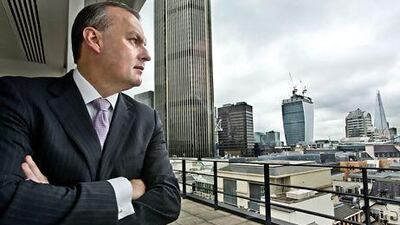Christopher Laing doesn't really like the phrase "suitcase banking."
The Deutsche Bank executive, London-based managing director of emerging markets' equity capital business, has been the driving force behind some of the biggest deals involving Arabian Gulf companies for several years, and thinks a global perspective is essential.
"Who bought the shares in Al Noor and NMC?" he asks. "Mainly global investors based outside the GCC. Our knowledge of global markets helped ensure these initial public offerings were executed successfully - and my knowledge of international investor appetite and requirements would be much harder to obtain if I was not based in London."
He is referring to two recent IPOs of UAE companies on the London Stock Exchange. Al Noor Hospitals and NMC Health, both solid businesses, were floated on the LSE in the past year, with Mr Laing as lead adviser.
Both have been successful, raising big money on good valuations and with positive trading in the aftermarket. But in the UAE there has been some criticism that they were not floated on local markets in Abu Dhabi or Dubai, which are in serious need of the business.
Mr Laing explains why he went for London rather than the UAE. "Al Noor would have liked to have listed locally, however the structure they wanted did not fit with local rules. Firstly, with local listings, IPO proceeds must go to the company rather than the pre-IPO shareholders, and the company only required US$150 million of capital, that would not have created a liquid market.
"Secondly, there is the freeflow requirement that 55 per cent must be floated, which would have left the three main shareholders as minority investors. These were some of the challenges in the Securities and Commodities Authority-regulated markets in UAE, but there were others too."
Mr Laing also had reservations with Nasdaq Dubai, the market designed to attract international investors into the UAE but which has mostly failed to attract big equity listings. "With Nasdaq Dubai it would not have been possible to sell onshore in the UAE, and we would have missed out on retail demand. Other Nasdaq Dubai flotations have had problems," he says.
So there seems to have been little debate when it came to listing Al Noor recently: London was the place.
"Al Noor saw the NMC transaction and realised it was possible to go to London instead," says Mr Laing.
"We're very pleased with the way Al Noor has gone. It floated at 575p and today is trading at 620p, in a market that's not been terribly kind to any of us. It has potential to raise up to £249m [Dh1.36 billion] depending on how much of the 'greenshoe' is exercised," he says. ("Greenshoe" is a term used by financiers for a mechanism that allots extra shares in a situation of unexpected demand.)
"The three major shareholders in Al Noor - Kassem Alom, Sheikh Mohammed bin Butti and investment group Ithmar - wanted a good price but the key desire was to trade well in the aftermarket, which it has done, says Mr Laing.
Although the focus of the two recent IPOs was London, that does not mean he has given up on UAE markets for local IPOs. "We would very much like to do more IPOs on local UAE markets and we monitor the listing rules very closely. The rules on the need to IPO at nominal value have been relaxed and book-building is now permitted, so there is a flexibility there," he says.
But he believes it would probably take an IPO of one of the big government-owned companies to kick-start local markets. "There are often rumours of other government sales. Emirates is the one always mentioned. Now markets have shown signs of recovery local IPOs have become a possibility once again. I would anticipate government transactions would be on local rather than foreign markets, but foreign investors would also have significant interest in many of these assets. The MSCI upgrade [to emerging market status] will be a great help," he says.
Some investors have detected a reluctance on the part of the government to "sell the family silver", that is, to float big chunks of government owned companies.
Does Mr Laing agree? "To some degree, yes. I think Emirates is pretty sacrosanct. But there are other quality businesses that might be considered, like Jumeirah for example. Also Salik, which is a very profitable business, and the Metro, which was regarded as a 'white elephant' by some when it opened but which is now very well used. Other quality assets include Dewa, Dubai Duty Free and the airports," he says.
Among non-government assets, he see more opportunities for IPOs in health care, but also in other consumer-related sectors, such as retail, leisure and education.
And to the suggestion of suitcase banking, he says: "I've still got an office in the DIFC and am in Dubai and the region almost every week."

